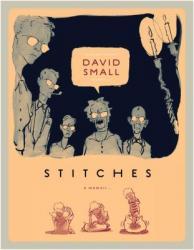
This is an autobiographical graphic novel of the author, David Small. The book focuses on his early childhood to early adulthood. It shows the progression of his relationship with his father, a doctor, and his mother, a homemaker in a very reserved and controlling dysfunctional household. As a young man, he ends up with a tumor on his neck that is removed but damages his vocal cords, and doctors say he won't speak again. Along the way, he discovers who his family and himself are and finds out more than he bargained for.
This book is very dark and the color scheme is perfect for the tone of this book as well, using black, white, and shades of gray primarily. The art is contemporary in its quality and color scheme but has a more retro feel to its style of art as well, especially in the faces, which gives it the feel of the era the book was set in. This book is the type of book you would be able to, and due to its page turn-ability you likely will, finish in one sitting. It's easy to get invested and feel all the emotions and heartbreak of the author along the way. It can be a bit hard to read since it is darker in its focus and has a realistic feel. It also has a few twists and turns along the way which help keep you even more entranced by the book. I really enjoyed reading it as a change of pace for myself since I typically deal in a bit lighter fair in terms of topics. It addresses issues of mental illness and controlling behavior well without being preachy or self pitying. I might not read this book again but I certainly won't forget it either. If you like dark, realistic graphic novels, this just might be your next favorite book!

This is an autobiographical graphic novel of the author, David Small. The book focuses on his early childhood to early adulthood. It shows the progression of his relationship with his father, a doctor, and his mother, a homemaker in a very reserved and controlling dysfunctional household. As a young man, he ends up with a tumor on his neck that is removed but damages his vocal cords, and doctors say he won't speak again. Along the way, he discovers who his family and himself are and finds out more than he bargained for.
This book is very dark and the color scheme is perfect for the tone of this book as well, using black, white, and shades of gray primarily. The art is contemporary in its quality and color scheme but has a more retro feel to its style of art as well, especially in the faces, which gives it the feel of the era the book was set in. This book is the type of book you would be able to, and due to its page turn-ability you likely will, finish in one sitting. It's easy to get invested and feel all the emotions and heartbreak of the author along the way. It can be a bit hard to read since it is darker in its focus and has a realistic feel. It also has a few twists and turns along the way which help keep you even more entranced by the book. I really enjoyed reading it as a change of pace for myself since I typically deal in a bit lighter fair in terms of topics. It addresses issues of mental illness and controlling behavior well without being preachy or self pitying. I might not read this book again but I certainly won't forget it either. If you like dark, realistic graphic novels, this just might be your next favorite book!

This is an autobiographical graphic novel of the author, David Small. The book focuses on his early childhood to early adulthood. It shows the progression of his relationship with his father, a doctor, and his mother, a homemaker in a very reserved and controlling dysfunctional household. As a young man, he ends up with a tumor on his neck that is removed but damages his vocal cords, and doctors say he won't speak again. Along the way, he discovers who his family and himself are and finds out more than he bargained for.
This book is very dark and the color scheme is perfect for the tone of this book as well, using black, white, and shades of gray primarily. The art is contemporary in its quality and color scheme but has a more retro feel to its style of art as well, especially in the faces, which gives it the feel of the era the book was set in. This book is the type of book you would be able to, and due to its page turn-ability you likely will, finish in one sitting. It's easy to get invested and feel all the emotions and heartbreak of the author along the way. It can be a bit hard to read since it is darker in its focus and has a realistic feel. It also has a few twists and turns along the way which help keep you even more entranced by the book. I really enjoyed reading it as a change of pace for myself since I typically deal in a bit lighter fair in terms of topics. It addresses issues of mental illness and controlling behavior well without being preachy or self pitying. I might not read this book again but I certainly won't forget it either. If you like dark, realistic graphic novels, this just might be your next favorite book!

This is an autobiographical graphic novel of the author, David Small. The book focuses on his early childhood to early adulthood. It shows the progression of his relationship with his father, a doctor, and his mother, a homemaker in a very reserved and controlling dysfunctional household. As a young man, he ends up with a tumor on his neck that is removed but damages his vocal cords, and doctors say he won't speak again. Along the way, he discovers who his family and himself are and finds out more than he bargained for.
This book is very dark and the color scheme is perfect for the tone of this book as well, using black, white, and shades of gray primarily. The art is contemporary in its quality and color scheme but has a more retro feel to its style of art as well, especially in the faces, which gives it the feel of the era the book was set in. This book is the type of book you would be able to, and due to its page turn-ability you likely will, finish in one sitting. It's easy to get invested and feel all the emotions and heartbreak of the author along the way. It can be a bit hard to read since it is darker in its focus and has a realistic feel. It also has a few twists and turns along the way which help keep you even more entranced by the book. I really enjoyed reading it as a change of pace for myself since I typically deal in a bit lighter fair in terms of topics. It addresses issues of mental illness and controlling behavior well without being preachy or self pitying. I might not read this book again but I certainly won't forget it either. If you like dark, realistic graphic novels, this just might be your next favorite book!
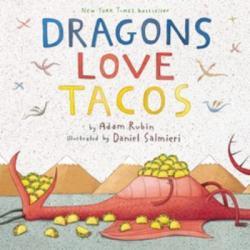
This story has it all, from tacos, to laugh out loud humor, to dragons, to colorful illustrations, and most importantly you also learn about why NEVER to give dragons totally mild salsa with jalapenos. The results are action packed, disastrous, and hilarious. Luckily, the dragons make everything right in the end.
This book is just plain old fashioned silly, and even a bit absurd, fun! The pictures in this book really capture the tone and elevate and enhance the story rather than get in the way. I'd even argue that they might be the main draw of this already entertaining book. The illustrator, Daniel Salmieri, didn't take the illustrations too seriously and you can tell they had as much fun making the book as you will reading it. Enjoy this lighthearted, humorous romp and feel free to enjoy a few tacos along the way when reading!
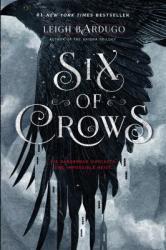
In the city of Ketterdam (imagine an alternate Amsterdam), Kaz is the first lieutenant of one of Ketterdam's most notorious and successful gangs. He's is approached by a city government official with an impossible task - rescue a scientist from the world's most well protected prison. And the prize? 30 million kruge. Kaz, of course, accepts. And he assembles a team of six to pull off what amounts to the world's most ambitious heist.
The story alternates between the POV of five of the six team members, and each character's story is gripping. All characters are developed throughout the course of the books, and each has their own distinct, fascinating voice and story. There's a sharpshooter, a magician, a traitorous solider, a demolitions expert, a wraith (read and find out!) and of course, the fearless leader, Kaz. And, to make things even better, they are a diverse group of people hailing from all over the world.
This book was really fun, and I've never really read anything quite like it. I will be booktalking this one and forcefully shoving it into the hands of anyone who comes into the teen center (I kid. I'll lovingly hand it to them while gushing effusively.). 5 stars

In the city of Ketterdam (imagine an alternate Amsterdam), Kaz is the first lieutenant of one of Ketterdam's most notorious and successful gangs. He's is approached by a city government official with an impossible task - rescue a scientist from the world's most well protected prison. And the prize? 30 million kruge. Kaz, of course, accepts. And he assembles a team of six to pull off what amounts to the world's most ambitious heist.
The story alternates between the POV of five of the six team members, and each character's story is gripping. All characters are developed throughout the course of the books, and each has their own distinct, fascinating voice and story. There's a sharpshooter, a magician, a traitorous solider, a demolitions expert, a wraith (read and find out!) and of course, the fearless leader, Kaz. And, to make things even better, they are a diverse group of people hailing from all over the world.
This book was really fun, and I've never really read anything quite like it. I will be booktalking this one and forcefully shoving it into the hands of anyone who comes into the teen center (I kid. I'll lovingly hand it to them while gushing effusively.). 5 stars
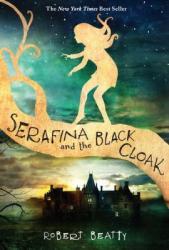
Serafina is the Chief Rat Catcher at Biltmore Estate in Asheville, NC in 1899. She and her Pa secretly live in the basement, where he is basically the electrical engineer of the place. Serafina's presence in the house is a secret so she mostly traverses the estate through tunnels and doesn't go outside. One night, she witnesses a man in a black coat magically abducting a child, which changes everything.
I listened to this book, and the narrator didn't really do it any favors. Her Southern accent was pretty terrible, but thankfully, she kept forgetting to use it. Narration aside though, this book had some problems. The author took a cool premise and an even cooler setting and then wrote a really boring book. There were kind of two main things going on that should have been really interesting, but weren't. The first thing was the identity of the man in the black coat, which was painfully obvious from the start. Had Beatty done a kiddo type version of an Agatha Christie novel (these are the people at the Biltmore estate...and one of them is guilty of MURDER MOST FOUL), I'd probably be typing a really different review right now. Alternatively, he could've played up Serafina's secret a bit more, and that might have made things more interesting. As it was, even though there was a lot going on, nothing of importance ever seemed to really happen.
I also found myself getting annoyed by a fictional Vanderbilt named Braedan (weird name for a kid of Dutch origins in 1899, dontcha think?) who is a bit of a love interest. Every part featuring him was pretty painful as Serafina basically becomes a useless quivering mess when he's around. Blegh. Oh, and at one point, a character says something along the lines of "you don't call girls heroes, you call them heroines" which, just, are you trying to say that girls can't be heroes? Because if so, gross. I'm paraphrasing, but that's what I took away from the statement.
But on the other hand... look at that cover! Gorgeous.
If 1.5 stars was an option, that's what we'd be doing here. I liked the beginning, the premise and the setting, but wish the author had done more with the latter two elements.
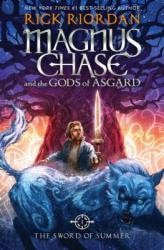
Popular mythology author Rick Riordan strikes again! He has series delving into Greek, Roman, Egyptian, and now NORSE mythology. This series follows Magnus Chase, son of a Norse god. Which god, you ask? Read the book and find out!
Riordan’s writing style is very distinct, playing to his youthful audience. The chapter titles were humorous and made no sense until I reached those parts of the book. (I read through them initially and thought, “What the…?!”)
Magnus Chase was vaguely--well, maybe more like strongly--reminiscent of Percy Jackson for me. Although Magnus has had a much rougher life so far, his voice is very similar to that of Percy. Magnus Chase is barely 16 years old, but he has been living on the streets for the past 2 years since his mother’s death. After an...interesting encounter with a fire giant, he finds himself gracing the halls of Valhalla with other Norse warriors killed in battle. Along with his valkyrie, a dwarf, and an elf, he goes on a quest to retrieve the Sword of Summer and stop the wolf Fenrir from escaping his bindings.
A interesting read for those die-hard Riordan fans or anyone who loves mythology interpretations. I was very entertained by the story, as I always am with Riordan’s mythologies, but despite the gods changing, the stories are starting to run together. The overlap of stories definitely doesn’t help the blurring of the lines. (Oh, hi Annabeth!) Crossing over from the Percy Jackson series, Annabeth, last name Chase--I guess we could have seen this one coming--has a couple nice little cameos in this book, foreshadowing a larger role later in the series. I’ll be interested to see where this goes.
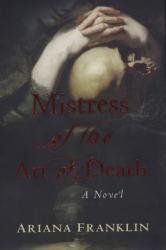
Set in medieval England, Adelia, a female surgeon, is hired by King Henry II as a forensic expert to investigate a series of murders taking place Cambridge. Even though it is a fictional novel, Franklin adds lots of historical details to the story, creating multiple layers to the plot. The murders are not the only mystery in this story, the characters themselves have their own veil of intrigue making the story all the more exciting!
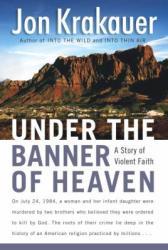
Wow. If there was anyway to just completely rile me up, it was to read this book. Which means the book was really good. I've known just a little about Mormonism from some kids I went to school with and such, but the fundamentalist side of it was alien to me (aside from polygamy). I really makes me wonder about the human condition and the types of religion it accepts, even if it seems like it's being accepted blindly. Great book, and written with more of the facts in mind, rather than a bias.
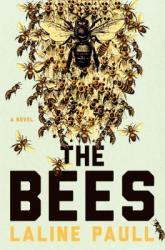
My first thought when this book was recommended to me was, “Bees? Is that metaphor? What do the bees stand for?” NOPE. This book is literally about bees. But not in a nonfiction, documentary kind of way. Here we have a novel in which we discover the world of bees personified.
Enter our main character, Flora 717. She was born the lowest of the low: the sanitation worker bee. Ugly, underappreciated, but unlike her fellow floras, she can speak. One of the higher levels of bees, a priestess to the queen, immediately takes notice of her oddities and experiments with her in roles not typical to a flora.
Flora 717 finds herself in almost every aspect of bee life at some point of her journey through the hive, uncovering secrets as she learns, grows, experiences the most profound loss, and transcends to the highest joys. The ordinary life of these black and yellow creatures we see and often fear is re-imagined into a relatable tale that pierces the veil between bees and humans. Though humans play very little role in the book, the bees exhibit many characteristics of humanity.
The tone of this book can be a bit dark at times with graphic imagery, but I highly recommend it.
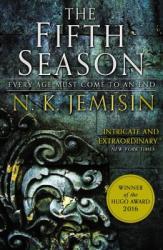
I loved this book. I've been looking for a new fantasy series for a long time now, but I haven't come across anything recently that's caught my eye. I almost gave up on The Fifth Season too, in part because the narration is in second person, which I found jarring at first, and in part because Jemisin drops you in the middle of the action with little explanation and no hand-holding. It took me a few chapters to get into the story and figure out what was going on, but I'm glad I stuck it out because the plot and characters ended up being great. Despite what I just said, I think it's almost better to go into this blind, but I'll try to describe it without giving too much away.
The continent our characters live on, "The Stillness," is a post-apocalyptic hellscape. There is near-constant seismic activity that triggers a new catastrophe (called a "Fifth Season") every few centuries -- sometimes in the form of massive crop-failures, sometimes in the form of volcanic eruptions, sometimes massive earthquakes that destroy whole regions (she includes a helpful appendix of these disasters if you're curious). In this world, there is a group of people known as orogenes (or more derogatorily as "roggas") who have some degree of control over seismic activity -- they can "sess" earthquakes, and, with training, prevent them from being too destructive. But they're also powerful, extremely dangerous, and widely despised -- many people kill their own children when they discover what they are, and it's often a race against time to see if a Guardian (their mysterious and sinister keepers) can arrive to collect the child before the family or the community has killed them. The plot isn't chronological; it moves around from chapter to chapter in order to tell three stories at three points in time: 20-odd years ago, when a young girl is taken to the capital to be trained as an orogene; some 10 years after that when a mid-level orogene goes off on a mission with her senior to investigate a disturbance in a coastal community; and "now," in the immediate aftermath of the latest apocalypse, when we follow a woman who is struggling to cope with her son's murder just as the quake hits.
I'm not going to say that it's an entirely original idea, but I think the execution was solid and I loved the dialogue and cast of characters. There's no lack of action, but Jemisin also takes the time to dig into her characters' emotional lives, and after a while the use of "you" starts to fade into the background. There's a strong focus on discrimination, both in terms of how orogenes are viewed in society and in terms of the treatment of subordinate nations and peoples by the Sanzed Empire that has conquered the continent. A lot of fantasy is set in pseudo-Europe (and often just pseudo-England), so it was refreshing to read something more diverse, and there's a wide variety of representation in terms of race, gender, and sexuality throughout. I would give this 4.5/5 stars if that were possible, but since it isn't I've left it at 4. It wasn't perfect, but it was a very strong start to the series, and I look forward to starting the second book, The Obelisk Gate, which just released this September. I would definitely recommend this to fans of fantasy.

I loved this book. I've been looking for a new fantasy series for a long time now, but I haven't come across anything recently that's caught my eye. I almost gave up on The Fifth Season too, in part because the narration is in second person, which I found jarring at first, and in part because Jemisin drops you in the middle of the action with little explanation and no hand-holding. It took me a few chapters to get into the story and figure out what was going on, but I'm glad I stuck it out because the plot and characters ended up being great. Despite what I just said, I think it's almost better to go into this blind, but I'll try to describe it without giving too much away.
The continent our characters live on, "The Stillness," is a post-apocalyptic hellscape. There is near-constant seismic activity that triggers a new catastrophe (called a "Fifth Season") every few centuries -- sometimes in the form of massive crop-failures, sometimes in the form of volcanic eruptions, sometimes massive earthquakes that destroy whole regions (she includes a helpful appendix of these disasters if you're curious). In this world, there is a group of people known as orogenes (or more derogatorily as "roggas") who have some degree of control over seismic activity -- they can "sess" earthquakes, and, with training, prevent them from being too destructive. But they're also powerful, extremely dangerous, and widely despised -- many people kill their own children when they discover what they are, and it's often a race against time to see if a Guardian (their mysterious and sinister keepers) can arrive to collect the child before the family or the community has killed them. The plot isn't chronological; it moves around from chapter to chapter in order to tell three stories at three points in time: 20-odd years ago, when a young girl is taken to the capital to be trained as an orogene; some 10 years after that when a mid-level orogene goes off on a mission with her senior to investigate a disturbance in a coastal community; and "now," in the immediate aftermath of the latest apocalypse, when we follow a woman who is struggling to cope with her son's murder just as the quake hits.
I'm not going to say that it's an entirely original idea, but I think the execution was solid and I loved the dialogue and cast of characters. There's no lack of action, but Jemisin also takes the time to dig into her characters' emotional lives, and after a while the use of "you" starts to fade into the background. There's a strong focus on discrimination, both in terms of how orogenes are viewed in society and in terms of the treatment of subordinate nations and peoples by the Sanzed Empire that has conquered the continent. A lot of fantasy is set in pseudo-Europe (and often just pseudo-England), so it was refreshing to read something more diverse, and there's a wide variety of representation in terms of race, gender, and sexuality throughout. I would give this 4.5/5 stars if that were possible, but since it isn't I've left it at 4. It wasn't perfect, but it was a very strong start to the series, and I look forward to starting the second book, The Obelisk Gate, which just released this September. I would definitely recommend this to fans of fantasy.

I loved this book. I've been looking for a new fantasy series for a long time now, but I haven't come across anything recently that's caught my eye. I almost gave up on The Fifth Season too, in part because the narration is in second person, which I found jarring at first, and in part because Jemisin drops you in the middle of the action with little explanation and no hand-holding. It took me a few chapters to get into the story and figure out what was going on, but I'm glad I stuck it out because the plot and characters ended up being great. Despite what I just said, I think it's almost better to go into this blind, but I'll try to describe it without giving too much away.
The continent our characters live on, "The Stillness," is a post-apocalyptic hellscape. There is near-constant seismic activity that triggers a new catastrophe (called a "Fifth Season") every few centuries -- sometimes in the form of massive crop-failures, sometimes in the form of volcanic eruptions, sometimes massive earthquakes that destroy whole regions (she includes a helpful appendix of these disasters if you're curious). In this world, there is a group of people known as orogenes (or more derogatorily as "roggas") who have some degree of control over seismic activity -- they can "sess" earthquakes, and, with training, prevent them from being too destructive. But they're also powerful, extremely dangerous, and widely despised -- many people kill their own children when they discover what they are, and it's often a race against time to see if a Guardian (their mysterious and sinister keepers) can arrive to collect the child before the family or the community has killed them. The plot isn't chronological; it moves around from chapter to chapter in order to tell three stories at three points in time: 20-odd years ago, when a young girl is taken to the capital to be trained as an orogene; some 10 years after that when a mid-level orogene goes off on a mission with her senior to investigate a disturbance in a coastal community; and "now," in the immediate aftermath of the latest apocalypse, when we follow a woman who is struggling to cope with her son's murder just as the quake hits.
I'm not going to say that it's an entirely original idea, but I think the execution was solid and I loved the dialogue and cast of characters. There's no lack of action, but Jemisin also takes the time to dig into her characters' emotional lives, and after a while the use of "you" starts to fade into the background. There's a strong focus on discrimination, both in terms of how orogenes are viewed in society and in terms of the treatment of subordinate nations and peoples by the Sanzed Empire that has conquered the continent. A lot of fantasy is set in pseudo-Europe (and often just pseudo-England), so it was refreshing to read something more diverse, and there's a wide variety of representation in terms of race, gender, and sexuality throughout. I would give this 4.5/5 stars if that were possible, but since it isn't I've left it at 4. It wasn't perfect, but it was a very strong start to the series, and I look forward to starting the second book, The Obelisk Gate, which just released this September. I would definitely recommend this to fans of fantasy.

I loved this book. I've been looking for a new fantasy series for a long time now, but I haven't come across anything recently that's caught my eye. I almost gave up on The Fifth Season too, in part because the narration is in second person, which I found jarring at first, and in part because Jemisin drops you in the middle of the action with little explanation and no hand-holding. It took me a few chapters to get into the story and figure out what was going on, but I'm glad I stuck it out because the plot and characters ended up being great. Despite what I just said, I think it's almost better to go into this blind, but I'll try to describe it without giving too much away.
The continent our characters live on, "The Stillness," is a post-apocalyptic hellscape. There is near-constant seismic activity that triggers a new catastrophe (called a "Fifth Season") every few centuries -- sometimes in the form of massive crop-failures, sometimes in the form of volcanic eruptions, sometimes massive earthquakes that destroy whole regions (she includes a helpful appendix of these disasters if you're curious). In this world, there is a group of people known as orogenes (or more derogatorily as "roggas") who have some degree of control over seismic activity -- they can "sess" earthquakes, and, with training, prevent them from being too destructive. But they're also powerful, extremely dangerous, and widely despised -- many people kill their own children when they discover what they are, and it's often a race against time to see if a Guardian (their mysterious and sinister keepers) can arrive to collect the child before the family or the community has killed them. The plot isn't chronological; it moves around from chapter to chapter in order to tell three stories at three points in time: 20-odd years ago, when a young girl is taken to the capital to be trained as an orogene; some 10 years after that when a mid-level orogene goes off on a mission with her senior to investigate a disturbance in a coastal community; and "now," in the immediate aftermath of the latest apocalypse, when we follow a woman who is struggling to cope with her son's murder just as the quake hits.
I'm not going to say that it's an entirely original idea, but I think the execution was solid and I loved the dialogue and cast of characters. There's no lack of action, but Jemisin also takes the time to dig into her characters' emotional lives, and after a while the use of "you" starts to fade into the background. There's a strong focus on discrimination, both in terms of how orogenes are viewed in society and in terms of the treatment of subordinate nations and peoples by the Sanzed Empire that has conquered the continent. A lot of fantasy is set in pseudo-Europe (and often just pseudo-England), so it was refreshing to read something more diverse, and there's a wide variety of representation in terms of race, gender, and sexuality throughout. I would give this 4.5/5 stars if that were possible, but since it isn't I've left it at 4. It wasn't perfect, but it was a very strong start to the series, and I look forward to starting the second book, The Obelisk Gate, which just released this September. I would definitely recommend this to fans of fantasy.
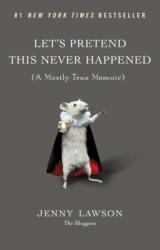
Jenny Lawson’s memoir is heart wrenching and laugh-out loud funny, especially if you have been touched by friends or family dealing with mental health challenges. I listened to it in the car and nearly drove off the road laughing.
Jenny knows she has problems and this is her story of how they carved out the details of her life – from her taxidermist father to Victor, her husband, and everything in between. Her stream of consciousness storytelling style is perfect. I could relate to, and actually picture, the absurdity of many of her stories. It was enlightening to see life through the eyes of the person dealing with the severe anxiety, depression and other quirks, and not just from an outsider’s viewpoint, thinking “What’s WRONG with you?”
I felt better knowing there are others that are dealing with the same mental health issues and that my family and I are not alone. You will probably put your family back on the normal and sane spectrum after reading this. I didn't care for some of the language that was strewn through the book, but it is part of the culture.
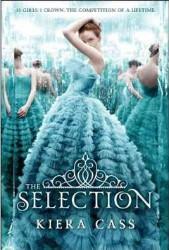
America Singer has been forced to enter in a competition to win Prince Maxon's heart. There's only one problem: she's in love with someone else. Marked by a brutal social class system, America either has the option to marry within her class or above it. She cannot marry her boyfriend Aspen Ledger, who is a class below her. So, she must enter "The Selection" to compete with a number of other girls for Prince Maxon's hand. Although the characters and plot were complex, I felt this book was lacking something - perhaps the conflict wasn't quite strong enough? I still recommend it for its excellent world-building and characters. (I'd rate this PG-13 for minor language and some romance)
Reviewer Grade: 9

America Singer has been forced to enter in a competition to win Prince Maxon's heart. There's only one problem: she's in love with someone else. Marked by a brutal social class system, America either has the option to marry within her class or above it. She cannot marry her boyfriend Aspen Ledger, who is a class below her. So, she must enter "The Selection" to compete with a number of other girls for Prince Maxon's hand. Although the characters and plot were complex, I felt this book was lacking something - perhaps the conflict wasn't quite strong enough? I still recommend it for its excellent world-building and characters. (I'd rate this PG-13 for minor language and some romance)
Reviewer Grade: 9
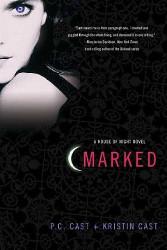
Marked by P.C and Kristin Cast is genius. The story follows a young girl named Zoe whose life is turned around. After dumping her alcoholic boyfriend and living with her loser step dad, Zoe is turned into a vampire who must attend The House of Night, a school for students like her. She soon finds that being a vampire isn’t so bad. This story is a 4/5, and I recommend it to anyone willing to read, however it does include some mature things so if you are not able to handle swearing, or any other such things the book is not for you.
Reviewer Grade: 7


